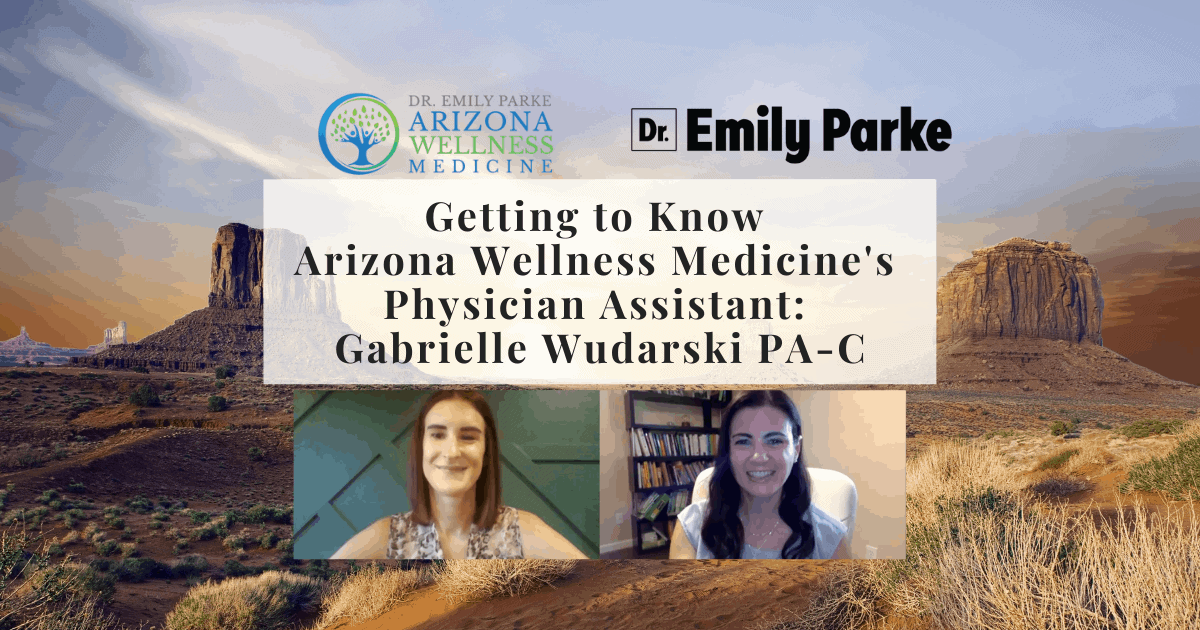Dr. Emily Parke: Hi everyone. This is Dr. Emily Parke, and today I have a very special interview for you. I am going to be introducing Gabrielle Wudarski. She is a PA that joined us about a year ago at Arizona Wellness Medicine. Welcome! Awesome. I’m going to start by introducing her with her bio and background. She is a board-certified physician’s assistant. She has a bachelor’s degree in Clinical Laboratory Science from Monmouth University and a master’s from A.T. Still University. She actually started her career back in family medicine and also worked in a urogynecology practice. She also did some work in Germany with the Army as well. We might get into that story a little bit later, too. She was born in Philadelphia, grew up in New Jersey, and is absolutely thrilled to be back here in Arizona. Welcome, Gabrielle.
Gabrielle: Thank you. Thank you for having me.
Dr. Emily Parke: Awesome. So obviously I just said you’ve been in the practice for about a year. I can’t believe it’s been that long.
Gabrielle: I know, I know, it’s been a crazy year.
Dr. Emily Parke: Yeah, it’s been a crazy year, obviously for many reasons, but I can speak from my own personal experience and from the staff’s experience, you guys, everyone has been loving Gabrielle. Rave reviews on her and even to the point where, you know someone’s good when they have a family member or a friend go see the same practitioner and that’s already been happening plenty for Gabrielle. So, welcome.
Gabrielle: Thank you.
Dr. Emily Parke: Awesome. As her supervising physician, I can say her clinical experience and her clinical abilities are really, really solid and Gabrielle and I talk about cases all the time, and when we see each other all the time, we will message about things, and we always make sure we’re staying on the same page, but it’s really cool because you and I, we get our education from a lot of similar resources, but we also listen to some slightly different things, so it’s kind of been kind of cool to chat on a regular basis with you on certain subject areas.
Gabrielle: Absolutely. I think that’s probably the best part of being at Arizona Wellness Medicine is having a really wonderful support system with you and the other docs in the office that just like bounce ideas, look at this patient and look at this case and kind of really work on it together, collaborative. Kind of collaborative care with everyone.
Dr. Emily Parke: Love it. Awesome. What I didn’t mention is that Gabrielle has done the entire IFM, Institute for Functional Medicine training program already. So I would love you to tell the audience, how did you start in functional medicine? What’s your pathway to functional medicine?
Gabrielle: Sure. When I was working in urogynecology in Houston, my doctor there recommended this book and it was called Clean by Alejandro Junger and it was kind of a cleanse, but based on food, and using food as medicine, and I did it on myself, just like every good functional practitioner does, try it out on yourself first, and I was like, “Wow, who knew I was so bloated all the time?” And I was just really captivated, like, wow, food is such a big part of us and it’s information for our body.
I really kind of just branched out from there. I was like, “Okay, how am I going to learn more?” And I researched different certification programs, and I settled on IFM because I really think they are kind of the gold standard of functional medicine. So I started my coursework in the fall of 2019, actually, while I was in Germany, I was learning online, functional medicine, and just kind of progressed from there. My case report is about to be submitted and then I take my exam in the fall and I’ll be a, fingers crossed, certified functional practitioner.
Dr. Emily Parke: Awesome. Love it. Love it!
Gabrielle: Yeah. All good.
Dr. Emily Parke: Yeah, I have no doubt you’re going to crush it. Absolutely. The audience hears from me all the time on what I think functional medicine is. And I always am talking about those five foundations to health, nutrition, sleep, exercise and movement, stress management, toxin reduction, and I know you feel the same way, but I would love for you to tell the audience a little bit more about your take on functional medicine and maybe even what you think the main differences and/or advantages are between functional medicine and traditional medicine.
Gabrielle: Absolutely. I really love IFM . We submit it to all our patients too, their tree, the functional tree, which basically looks at, in the leaves of a tree are all the symptoms, and all the kinds of specialties you might see. If you cough, it’s like, “Let’s go to a pulmonologist,” and then as we move down the tree, the root cause of this cough could be related to diet or exercise or sleep, could be related to anything, and I really think in functional medicine, that’s what we’re looking for. Really like the root, what is the actual problem here? And sometimes it’s not a simple, “Oh, it’s a certain supplement for this.” It’s really kind of working with all the body systems together, and I really think that’s what sets functional medicine apart.
Like Dr. Parke said I started in family medicine, and after a while, I think you get a little disenchanted because you’re trying so hard, and I really wanted people to be well, and it was just kind of like, this pill and layering and this specialist and just trying, it’s really challenging to just try to coordinate all of that, and so really I think we take the whole patient into consideration. I also think the biggest difference functional/conventional is that we have time in functional medicine. Unfortunately, with insurance-based models, conventional just doesn’t get that luxury. I have an hour and a half with my first patient. I really feel like I get to them really well and really get to the root of what’s going on with their conditions, medically.
Dr. Emily Parke: Awesome, awesome. Gabrielle just brought up a great point. All of our new patient visits at Arizona Wellness Medicine are 90 minutes for a standard visit. If someone has a really complex or complicated case and a long history, we actually even have extended visits available for those specific cases so we can get through the entire history. And then, our first follow-up visit is still long. It’s 60 minutes long and at that visit, that’s where we go over all the lab results in detail, and we talk about this concept of normal versus optimal. Where’s the patient in that? How is it affecting their health and what are we going to do about it moving forward?
And so, as you mentioned, the importance of having enough time with the patient, and also, I like to call it a team sport too, right? It’s like we are helping the patients through their health challenges to optimize their health. It is not the old paradigm of “We’re the practitioner do what I say, because I said so.” We want input from all sides.
Gabrielle: Absolutely. And I think it’s interesting, because as the patients fill out their paperwork, it’s very extensive, but it’s for a reason, because we really do want to know. I think they put pieces together themselves too, and we’ll talk about it, and they’re like, “Light bulb! Wow, this was a big moment for me to realize this.” So it’s fun to work together and figure that stuff out, too.
Dr. Emily Parke: Yeah, you’re absolutely right. Filling out the patient’s forms, filling out, especially, the timeline can be really therapeutic because a lot of people haven’t really thought about their whole health history from birth until now and how it may be affecting what’s going on with their current symptoms, so that’s another great example of what makes functional medicine a little bit different than traditional medicine.
Gabrielle: Yeah. I love the question. “When was the last time you felt well?”
Dr. Emily Parke: Yeah.
Gabrielle: Really makes you think like, “Okay, when did I feel my best and what happened? How did things just kind of turn all of a sudden?” I like that one, too.
Dr. Emily Parke: Absolutely, absolutely. You guys also know part of functional medicine is our ability to order and understand the results of all these advanced tests, not just traditional blood work, but stool studies, SIBO tests, organic acids test, mold testing, environmental toxins testing, heavy metals testing, and so on and so forth. Food sensitivities. There’s so many other tools we have in the toolbox in functional medicine, too. And hormone testing, so much we can do and look at from a different perspective to really give the patient a 360-degree view of their health.
Gabrielle: Absolutely. And I think another really valuable resource for us specifically in our office is the availability of a health coach who is the behavior implementer. Like we all know what we should be doing, but she’s the one that’s like, “This is how we’re going to do it,” and makes it personal for each person because everyone’s so unique in that way, and what their struggles are and what do we need to kind of hone in on? And behavior modification is huge in functional medicine because the roots are the diet, the sleep, the exercise, and we need to kind of implement those good behaviors. So she is just like the most amazing resource.
Dr. Emily Parke: Awesome. Love it. Love it! So you guys, everyone, if you’re looking to get involved in functional medicine, you want to see a functional medicine practitioner, I would highly recommend you check out Gabrielle. Again, I am, as you know, I am her supervising physician. So, we talk about all the cases, I have to sign all of the notes, and so we are kind of in constant contact about cases.
If you want to see her, call us at (602) 892-4727! That’s the office line. And someone will get you set up and started with the process of filling out our forms and consents. As Gabrielle mentioned, they are quite extensive because we really want to get to know you super, super well.
If there’s any, even after talking with our staff, if there are any questions you have, if you’re like, “I’m not sure if functional medicine is a good fit for me,” we do offer a free 15-minute phone consultation, so you would actually be able to schedule a time where you could get on the phone with Gabrielle and talk about your specific case to make sure you’re comfortable with her and she is comfortable taking your case, making sure it’s a good fit. Because we always want to make sure it’s a good fit before we start the process.
Awesome. Gabrielle, anything else you want to add or tell the audience?
Gabrielle: Yeah, I would say I really do love learning. I feel like functional medicine, I think you get into medicine and it’s forever learning, no matter what. Conventional, functional, doesn’t matter. But I feel functional, there’s so much coming out about it all the time and I just feel like the information is endless, and so I’m always constantly learning and educating and challenging myself.
Some patients come and they’re a little bit more complicated and we have to kind of work through layers and we talk about functional medicine as an onion and kind of start from the outside and peel the layers back slowly. You can’t start right in the center, we kind of have to work our way in. So I’m just always brainstorming. I have a patient I’m working with now who, we’re just working. We’re constantly brainstorming ideas of what is going on with her. So we’re working really hard on that and I love it.
Dr. Emily Parke: Awesome. Awesome! Well, thank you so much. We’re so fortunate and lucky to have you at Arizona Wellness Medicine. Again, if you want to book with Gabrielle, give our office a call. (602) 892-4727. Take care. Bye.
Gabrielle: Bye.









